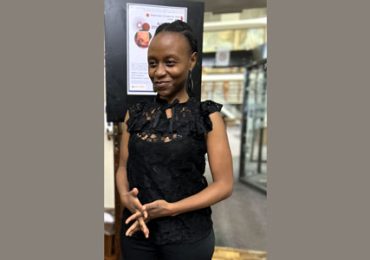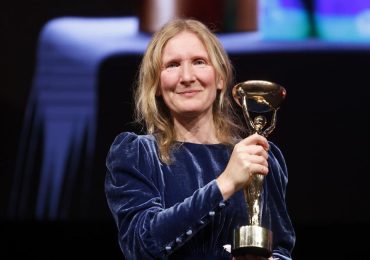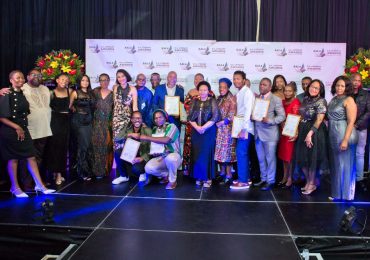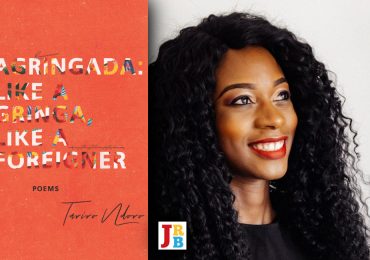Authors are sometimes only properly appreciated after they are gone, but Gcina Mhlophe and Sindiwe Magona are two writers who can be in little doubt about the impact they have made on South African literature.
Between them, Mhlophe and Magona are the authors of numerous children’s books, poetry collections, plays and novels.
During its annual festival in April, the Puku Foundation, an organisation focusing on children’s literacy, honoured Mhlophe for the legacy she continues to build, after honouring Magona in 2016.
Meanwhile, Magona was awarded an honorary doctorate for her contribution to literature from Rhodes University this year, after Mhlophe received the same honour in 2014.
Watch a video of Magona’s conferral here:
At her speech during the Puku Festival, at the 1820 Monument in Grahamstown, Mhlophe emphasised the importance of telling our own stories:
Am I big enough for all the praises? When I sit in dressing rooms getting ready to represent my country on different international platforms, I meditate to this song: ‘Ndingawi ngobugwala bam nangokuziqhayisa kwam’—May I not fail because I was too timid. May I not fail because I was too pompous.
I am full of gratitude to Puku and all the people that believe in education. Without education we have leaders who do not have sufficient knowledge and a culture to lead.
Young people must realise the value of our own stories. The story is the mother of all creative arts. A dance without meaning or a message is just a dance.
To the young people who celebrate my work, I have no words. I am so lucky. You are growing so beautifully. I want to be there with my walking stick and numb knees when your careers blossom, buying your ticket, bidding for your painting. Support one another, please.
I have represented many voices that have been shut down on this very stage. We must always be aware that telling the stories of our people in our work makes us cultural ambassadors.
My father taught me that the most beautiful word in the Zulu language is ‘Ngiyabonga’.
Sindiwe Magona also spoke at the event, saying not enough it done to ensure children encounter Mhlophe’s work:
I am bothered by the way we do not care for what is ours.
I am in the process of trying to write a book of essays and one of them will be titled ‘I have many mothers’. Some of them are men and some of them are younger than me. Gcina Mhlophe is one of them. These are the people who have made me who I am today.
I am not a trained writer but I aspired. I quickly learnt that writing for children is not easy. Stories have to make sense and be concise. Gcina called me up one day wanting to partner in a project with Oxford University Press at a time when I was thinking of venturing into children’s books. Today I have written lots of books, but Gcina is still the best. She is excellent.
Nobody comes into the world empty-handed. All children are born with with their hands tight-fisted because that is where our maker puts the talents we bring into the world.
Why are we here? What kind of soil are you? What is in your mind and heart? What were you made for? Combine your work and your purpose into one thing. Success is living a life worth having. A life lived in awareness.
Your language, your storytellers, your books; that is your political awareness. It is not enough to raise a fist: read. Honour your storytellers by buying their books as gifts for your children. Reward them with knowledge.
It is a disgrace that children can reach matric without encountering a Gcina Mhlophe book within the education system. The Department of Education needs to ensure this happens. There is something lacking in the essence of our being that we dishonour ourselves this much.
John Kani was also at the festival to pay tribute to Magona. He made his speech in isiZulu; Puku has provided a translation for The JRB:
When I speak of Gcina, my heart gets filled with joy. I met her in the early eighties at the Market Theatre. Today she is my little sister, but she is an elder at the same time, because of the wisdom she possesses. Her gift comes directly from the ancestors. The true history of who we are has been passed down through storytelling since centuries back. If you listened the way Gcina did, you would find that the stories equipped us with knowledge, education, preparation and warnings.
Our ancestors knew that a time would come when we would need to rely on our identity, our pride, our legacies, so desperately. In the eighties, Gcina wanted to do a short play called ‘Have You Seen Zandile’. This became her first performance at the theatre. I will never forget it. It was simple, powerful and captivating.
I am happy that this wise and gifted woman is being honoured in this manner, in front of the old and the young. She is the keeper of our traditions, our history, our pride and our future. She is the ultimate matriarch who knows no boundaries.
Our youth do not read, and they are not told our stories. Gcina has opened libraries in rural areas in order to bring back the parent and grandparents that tell stories. This gives our children deeper knowledge of their culture in languages they understand.
Halala Maz’anethole. You have wings. Young people, here is a leader to follow!
Watch Kani’s tribute here:
View a gallery of the Puku celebrations:
Additional reporting by Khuthala Adam.





